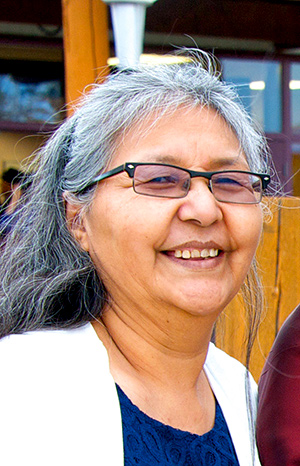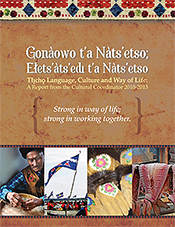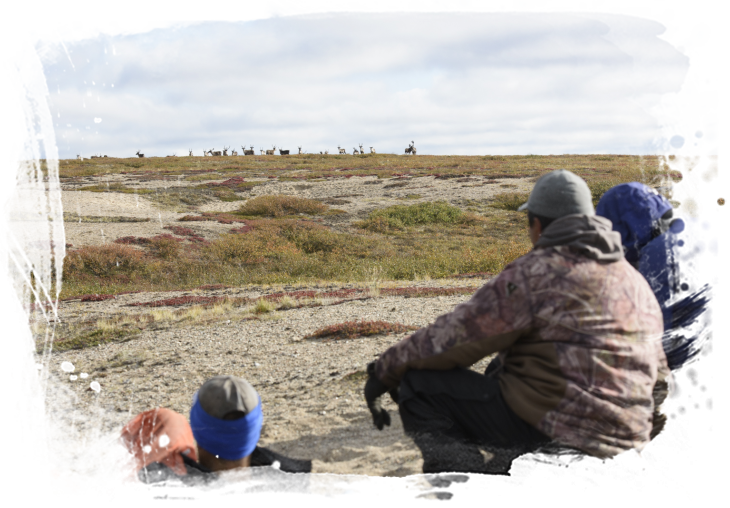The first Cultural Coordinator was selected in March 2010 by the Tłı̨chǫ Implementation Committee made up of representatives of the Federal Government of Canada, the Government of the Northwest Territories, and the Tłı̨chǫ Government. Lucy Lafferty of Behchokǫ̀ was chosen to be the first Cultural Coordinator under section 8 of the Tłı̨chǫ Intergovernmental Services Agreement. She was seconded from the position of Director of Education for the Tłı̨chǫ Community Services Agency. Lucy brought to the Cultural Coordinator position extensive experience of over 30 years as an educator in the Tłı̨chǫ schools. She had served in a variety of positions as an educational assistant, a teacher, a school principal, a program consultant and a Director of Education.

Lucy Lafferty,
Cultural Coordinator 2010-2013
Initially the position was placed within the offices of the Tłı̨chǫ Community Services Agency (TCSA) in Behchokǫ̀ but in June 2012 the office of the Cultural Coordinator was co-located within the culture department of the Tłı̨chǫ Government. Since 2010, the Cultural Coordinator has provided support to the Tłı̨chǫ Government, the Tłı̨chǫ Community Services Agency and the Government of Northwest Territories in the development of their language and culture planning. This has included the GNWT/TCSA five year plan for Tłı̨chǫ Yati (language). The Cultural Coordinator also assisted with the development of the award winning Tłı̨chǫ Įmbè summer program in Whati, Gameti, and Behchokǫ̀, coordinated and facilitated a gathering of Tłı̨chǫ interpreters, elders, youth, and language advocates at a fish camp at Russell Lake, participated in the Trails of our Ancestors canoe trip to Whati with youth, community members and elders, and worked with elders from the four communities on Tłı̨chǫ translation and standardization research.
Other research activities of the Cultural Coordinator have included: reviewing past, present and future government activities in the Tłı̨chǫ region, the Tłı̨chǫ Immersion Program, residential school issues and the Truth and Reconciliation process, Tłı̨chǫ Land Claim and Self-Government issues, Canada and the Aboriginal Land Claims and Self-Government policy and processes, aboriginal language, literacy, NWT Official Languages, the cultural impact of loss of caribou, mining companies and their interests on Tłı̨chǫ lands along with federal environmental assessment panel reviews, Tłı̨chǫ interpreters and translators coursework including a review of materials developed by the Yamozha Kue Society, Navajo, United Nations, Maori and Hawaii.
Committee work has included the GNWT Health and Social Services Official Language Committee with the mandate to ensure HSS compliance with the Official Languages Act of the NWT, Official Languages Consultant to GNWT Departments including northern Health Authorities, the committee to develop an NWT Labor Force Development Framework 2010-2020, the GNWT Official Languages Board and the NWT Steering Committee on Teacher Education Programs.
Other topics of involvement have included devolution, the GNWT and the Tłı̨chǫ Government, the potential sociocultural impact of Fortune Minerals mining interests adjacent to the Tłı̨chǫ community of Whati, aboriginal students, education and the recent national and local “ Idle No More” events.
The Cultural Coordinator released their triennial report “Gonàowo t’a Nàts’etso; Ełets’àts’edı t’a Nàts’etso: A Report from the Cultural Coordinator 2010-2013” in the spring of 2013. This is the first three-year report from the office of the Cultural Coordinator required under the Tłıc̨hǫ Intergovernmental Services Agreement (ISA). This report gives an overview and recommendations regarding Tłıc̨hǫ language, culture and way of life in relation to the activities of the three governments who are parties to the ISA: the Government of the NWT, the Government of Canada and the Tłıc̨hǫ Government.
Download:
Gonàowo t’a Nàts’etso; Ełets’àts’edı t’a Nàts’etso: A Report from the Cultural Coordinator 2010-2013


